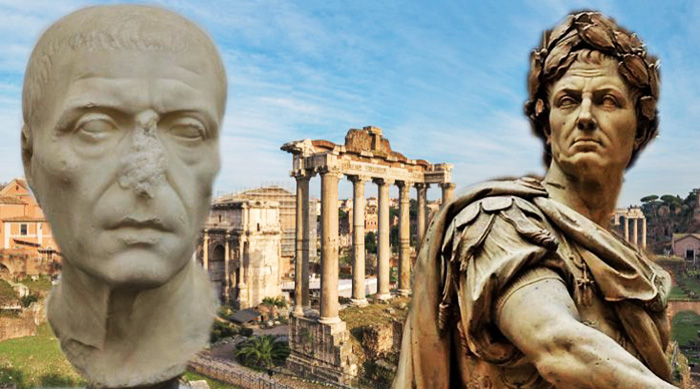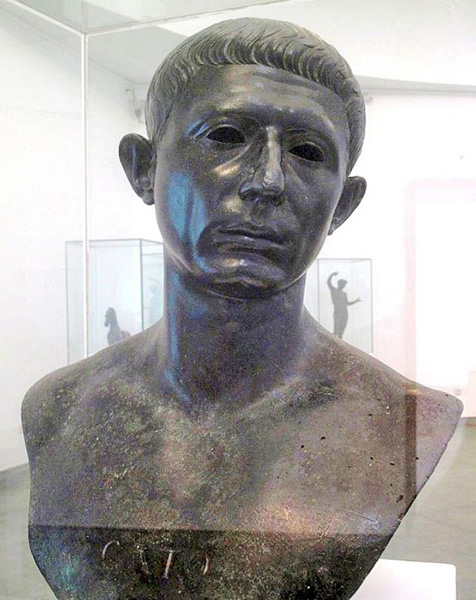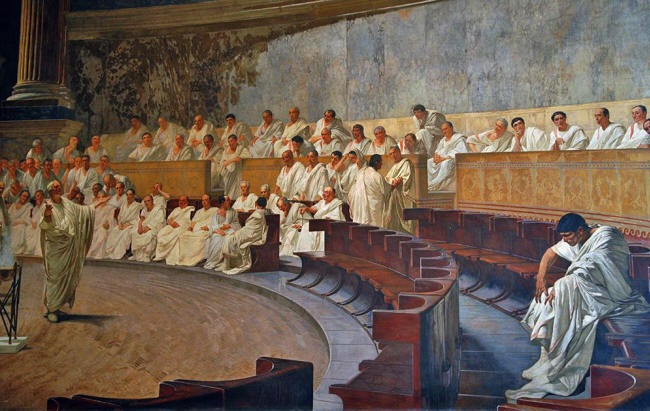|

by Ellen Lloyd
April
17, 2021
from
AncientPages Website
Italian
version

When Cato was a child,
one could see he would be different one day.
He was extremely
stubborn and could not tolerate obvious signs of injustice.
He was only 13-year-old
when he questioned the Roman general and dictator Lucius
Cornelius Sulla's harsh methods along with violations of laws
and regulations.
Once he became aware of
how Sulla in the year 82 B.C. seized power by force and proclaimed
himself dictator, Cato asked his teacher why no one had killed the
brutal Roman general yet.
According to the Greek philosopher, biographer, and essayist,
Plutarch, the teenager Cato whispered to his teacher Sarpedon:
"'Why does nobody
kill this man?'
'Because,' said
he, 'they fear him, child, more than they hate him.'
'Why then,'
replied Cato, 'did you not give me a sword, that I might
stab him and free my country from this slavery?'
Sarpedon hearing
this, and at the same time seeing his countenance swelling with
anger and determination, took care thenceforward to watch him
strictly, lest he should hazard any desperate attempt." 1
At the time, one could
already see Cato was going to be a determined man with enormous
willpower.
Born in 95 B.C. in Utica, Africa (now in Tunisia) Marcus Porcius
Cato, also known as Cato of Utica or Cato the Younger
was a very conservative Roman senator.
He struggled to preserve
the Roman Republic against power seekers, such as Julius Caesar,
whom he hated more than anything.
Maybe it was his unusual personality or the fact that he was immune
to bribes and fought to uphold Roman traditions that contributed to
the glorifying accounts of his reign by later authors.
To many, Cato the Younger
represented a model of virtue.
In time, Cato the Younger showed he was suitable for becoming a man
of great political importance.
Cato's grandfather Cato the Elder (234 B.C. - 149 B.C.) had
been famous for his conservative and anti-Hellenic policies.
Cato
the Younger demonstrated his strong will to maintain the old Roman
traditions on numerous occasions.
In 78 B.C. the year Sulla died, Romans wanted to wipe out the memory
of his dictatorship.
City officials wanted to
remove a pillar that stood in the way in the large assembly hall
Basilica Porcia, but Cato, who was 18 years, showed up and
protested.
Defending the pillar
that had been erected by his grandfather Cato the Elder, Cato
argued the structure had stood there for hundred years, and
there was absolutely no reason to change it.
His speech made an
impression, and it was decided not to remove the pillar.
Walking around with his long hair and unshaven face, some could
easily mistake him for a cave dweller, but Cato didn't bother with
his appearance, and he was undoubtedly not vain.
Cato the Younger consciously asserted his old Roman virtue by
wearing his toga without a tunic and,
"he became accustomed
to enduring heat and snow with his bare head and to moving on
foot without a vehicle," writes the historian Plutarch.
Cato The
Younger Was An Honest Leader In A Corrupt Age
Cato the Younger's political career started in 65 B.C., a turbulent
period in the history of ancient Rome.
The Roman population was divided.
The underclass had
become poorer than before, with even more debts and many
populists demanded radical social and political changes.
Cato the Younger had just
returned to Rome after finishing his military commission in Macedon
and a personal journey in the Middle East.
At the age of 28, Cato the Younger was elected as quaestor, a
position that provided him with the knowledge of the Roman tax code.
Cato soon discovered that
former men in the post office had made a lot of money by accepting
bribes to erase some debts, which was unacceptable to him.

Bronze bust of Cato the Younger
from the Archaeological Museum of Rabat, Morocco.
Found in the House of Venus, Volubilis.
Credit: Prioryman - CC BY-SA 3.0
"Once elected
quaestor, Cato in his first act, stabbed straight at the
heart of the bureaucracy.
He summarily fired
all clerks and assistants whom he judged unfit for office or
guilty of corruption. It was the kind of wholesale housecleaning
that made headlines - and drew out the long knives of the career
of clerks.
Who did this
young man think he was?
What didn't he
understand about the compact between the elected and the
appointed?
This sort of thing
was especially appalling from a son of the establishment that
had so benefited from the energies and exertions of the
bureaucracy.
Cato, though, was oblivious to any backlash.
What was there to
know besides the fact that the law had been broken?
Still, as with his
military command he matched strictness with softness when
appropriate. In the course of his audit, he found that a number
of clerks had erred not willfully but out of ignorance of the
law.
These, he tutored in
the rules and responsibility of the treasury. If they were
willing to accept his tutelage, he was ready to keep them at
their jobs.
If not, they would be
shown a swift exit." 2
Cato's And
Caesar's Rivalry Begins In The Senate
Cato's righteousness attracted attention, and in 63 B.C. he was
elected to the people's tribune.
In the Roman Senate, Cato
the Younger met Julius Caesar, whom he despised. Looking
through the eyes of Cato, Julius Caesar must have been a bit of a
clown.
Cato the Younger followed
the principles of
Stoicism, and he was moderated in
every aspect of his life.
He adopted an ascetic
lifestyle with strict exercise, consumed only necessary food,
and drank the cheapest wine on the market.
He was a private man,
and parties were not on his agenda.
To a man like Cato the
Younger, the extravagance of Julius Caesar must have been appalling,
and there was no lack of disagreements between these two.

Representation of a sitting of the Roman senate:
Cicero
attacks Catiline,
from
a 19th-century fresco in Palazzo Madama,
Rome,
house of the Italian Senate.
Credits: Wikipedia
Cato the Younger was naturally very annoyed when Julius Ceasar was
elected one of Rome's two consuls in 59 B.C.
It was the republic's
most influential post.
And Cato warned
people were paving the way for a tyrant, but few listened.
Cato's opposition
to
Pompey, Caesar, and Marcus Licinius Crassus
helped bring about their coalition in the so-called First
Triumvirate that was broken in 54 BC simultaneously
as Cato's election as praetor.
Cato the Younger
attempted to obtain a consulship in 51 B.C.
Roman consuls usually seized power
through intimidation, bribery, and show business.
Cato the Younger
did no such thing which is most likely why he failed to become a
consul.
Cato The Younger
Committed Heroic Stoic Suicide
Julius Caesar
gathered his XIII Legion and declared war on Rome.
While Caesar
attacked and defeated his former ally Pompey, Cato fled to
Utica, but he understood this was the beginning of the end...
In April 46 B.C.,
news came that former consul Metellus Scipio and his army
that defended Utica had fallen.
Cato managed to
encourage the few Romans in Utica to defend the city, but they soon
realized they had no chance against Julius Caesar's army and asked
to leave the doomed city.
Their wish was
granted...

Statue of Julius Caesar in Rome.
Credit: Adobe Stock - james_pintar
When Cato's son
asked him to give up, he refused:
"I, who grew up
in freedom with the right to speak freely, can not change in the
autumn of age and learn to be a slave," he explained, according
to the author Dio Cassius.
The same night,
Cato the Younger took his sword and stabbed himself in the stomach,
but he didn't die at once.
When his relatives
found him, they called for a doctor who stitched together the
wound. As soon as Cato regained consciousness, he tore up the wound
again with his last strength and died.
Cato ending his
life became the solemnly revered and much imitated model of the
heroic Stoic suicide.
It was the way in
which the younger Cato chose to stage his end and the way in which
others celebrated it thereafter that explain why political opponents
of the Emperors, who were ordered to kill themselves or even were
actually executed, came to thought of, and probably thought of
themselves, as following the great Stoic Cato in death. 3
When Julius Cesar
heard the news, he shouted:
"Cato, I grudge
you your death, as you would have grudged me the preservation of
your life."
Two years later,
Julius Caesar
was assassinated.
References
-
Plutarch - Cato the Younger
-
Rob Goodman - Rome's Last
Citizen: The Life and Legacy of Cato, Mortal Enemy of
Caesar
-
Griffin, Miriam. "Philosophy, Cato, and Roman Suicide:
II." Greece & Rome33, no. 2 (1986): 192-202.
| 




